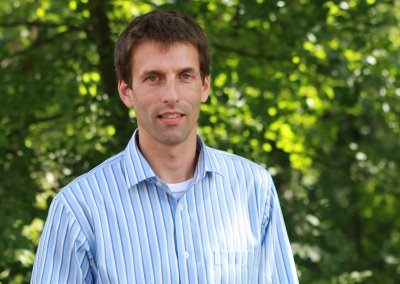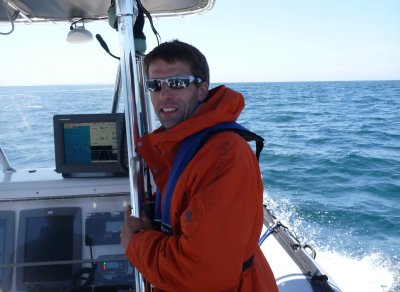Investigating ocean eddies: Prof. Dr. Burkard Baschek is a new director at the Institute of Coastal Research
Prof. Dr. Burkard Baschek is a new director at the Institute of Coastal Research of the Helmholtz-Zentrum Geesthacht since July 2012. Following a five-year professorship at the University of California in Los Angeles, the oceanographer is now the head of the division “Operational Systems”. He is responsible for the scientific development of ocean observing systems to investigate processes such as ocean currents or waves in coastal waters.

Prof. Dr. Burkard Baschek is a new director at the Institute of Coastal Research of the Helmholtz-Zentrum Geesthacht and is now the head of the division “Operational Systems”. Photo: HZG
With the arrival of Prof. Dr. Burkard Baschek in the division “Operational Systems” of the Institute of Coastal Research, the examination of submesoscale ocean eddies will become a new research focus and will complement established research activities.
Submesoscale eddies are relatively small, with a diameter of up to ten kilometres, but nevertheless play a significant role in the energy balance of global ocean circulation. Burkard Baschek, who is both an expert and a pioneer in this research field, explains: “I am investigating how these small eddies function as the “clockwork” of the global ocean circulation”.
His research has, thus far, mainly been carried out in coastal waters of North America. These eddies are now to be studied for the first time in the North Sea and Baltic Sea.

Research scientists must act with speed in order to investigate such eddies as they are formed and disintegrate within a few hours. Photo: private
Research scientists must act with speed in order to investigate such eddies as they are formed and disintegrate within a few hours and are not easily visible on the sea surface. Burkard Baschek has, therefore, developed his own observing technique.
The eddies are detected with a highly sensitive thermal imaging camera which is installed on an aircraft. Research scientists then approach the eddy in a speed boat. Amongst other variables, the temperature distribution in the eddy is examined with the aid of newly developed measuring instruments.
The results provide information on their role in the ocean energy budget, how near-surface mix water masses, or how they control the growth of micro algae. Burkard Baschek developed this technique over the course of his five years as professor at the University of California, before taking up his position in Geesthacht.
The Institute of Coastal Research, with its coastal observation and analysis system COSYNA (Coastal Observation System for Northern and Arctic Seas), offers a perfect base for this new research field. The 50 employees of the division “Operational Systems” provide Burkard Baschek with various oceanographic expertise as well as engineers and technicians to work at his side.
The position as Director of the Coastal Institute was awarded in combination with a professorship for “Coastal Research and Instrumentation in Coastal Oceanography” at the Christian-Albrecht University in Kiel - the university where the 41 year-old had previously taken his degree in physical oceanography.
Further Information
The Institute of Coastal Research Prof. Dr. Burkard Baschek’s personal website
Contact

Helmholtz-Zentrum Geesthacht
Phone: +49 (0)4152 87-1677
E-mail contactMax-Planck-Straße 1
21502 Geesthacht
